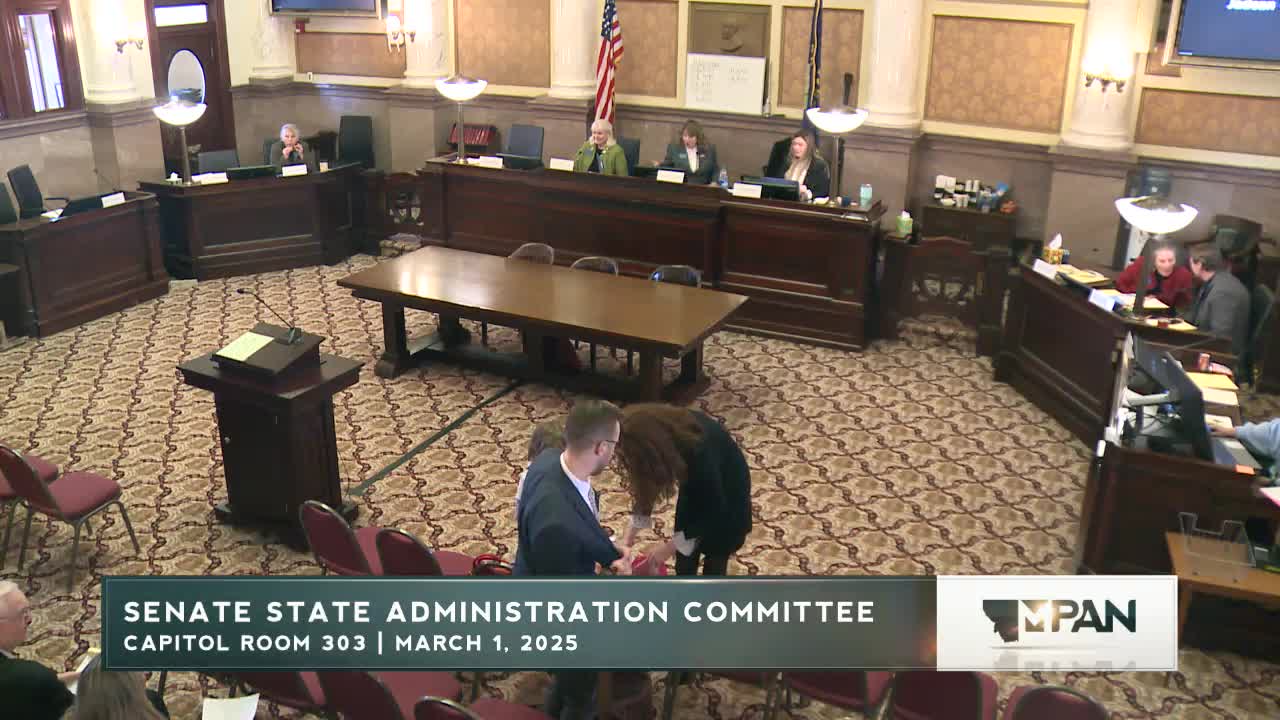Senate advances bill to reshape late voter registration hours; amendment added
Get AI-powered insights, summaries, and transcripts
Subscribe
Summary
The Senate State Administration Committee on Thursday approved Senate Bill 490, with an amendment, to change late voter‑registration hours in federal elections — adding Saturday hours, closing the Monday before election day for staff preparation, and limiting election‑day registration to 8 a.m.–noon.
Helena — The Senate State Administration Committee advanced Senate Bill 490 on a 6–3 vote after adopting an amendment that clarifies timing and severability. The bill, sponsored by Senator Jesse Cupp, would change late voter registration windows in federal election years so county election offices may do same‑day, late, and replacement registration on a revised schedule: keep open the Friday before the election through normal business hours, add Saturday hours from 8 a.m. to 5 p.m., close Monday to allow staff to prepare, and reopen Tuesday (election day) from 8 a.m. to noon for registration and changes.
Supporters said the schedule reallocation preserves the same total registration hours while easing the end‑of‑day crush election staff face. “The system is broken from a management perspective,” Director James (secretary of state’s office) told the committee, saying counties reported working long, overnight shifts and that Saturday hours give rural and working voters an extra opportunity.
The committee heard several local election administrators describe long waits and strained staff during recent elections. Angie Paulson, Broadwater County clerk and recorder, told the committee her office and other smaller counties had long lines and limited staff, and that shifting some work to Saturday would help “get supplies ready” and reduce lines on election night. Becky Stockton, a Lewis and Clark County chief election judge, described lengthy register‑printing tasks that would be eased by the added Saturday window.
Opponents, including the ACLU’s Henry Seaton and tribal representatives, said the change would reduce access for some groups who disproportionately use election‑day registration, such as indigenous voters, students and working people. “The elimination of election‑day registration creates an unnecessary additional barrier to the ballot box that may ultimately result in denying the right to vote,” Seaton told the committee, warning that Montana law restricting same‑day registration had been struck down by courts previously. Patrick Yawaki, representing multiple tribes, said the bill could “disfranchise young and indigenous voters” who face distinct access barriers and travel burdens.
The committee accepted an amendment (SB0490.001.001) that added a non‑severability clause so the Legislature’s intent would be explicit if parts are challenged. After debate the panel voted to send the bill out of committee as amended. A recorded roll call on final passage in committee showed six in favor and three opposed; senators explained on record that the bill’s language addresses both voters’ rights and administrators’ operational constraints.
What the bill would do: it preserves same‑day registration in a federal election but changes the times county offices must be open for late registration so clerks can process, print registers and prepare equipment on Monday. Supporters say the net registration hours do not shrink; opponents argue the practical effect will be to restrict access for voters who rely on late‑day opportunities.
Committee action and next steps: the committee adopted the amendment and reported the bill out with a do‑pass recommendation as amended. The committee recorded a roll call in which the motion to report out passed 6–3. Further floor action is expected; litigation over similar changes has occurred in prior sessions and several opponents indicated they would challenge such a law in court.
Context: Witnesses referenced past litigation over late registration (House Bill 176, 2021), the Montana Supreme Court’s scrutiny of voter‑access burdens and the statewide referendum on election‑day registration (LR‑126). Supporters said federal courts routinely uphold comparable rules for federal elections, while opponents cited Montana constitutional protections as central to the dispute.
Ending: The committee’s change aims to reduce overnight work for election staff and reduce election‑night lines, but it also set up a likely legal and public debate over access versus administrative practicality.
